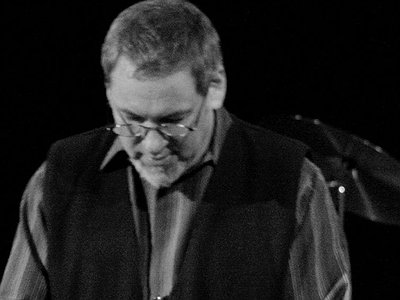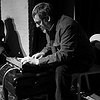Could you describe your creative process on the basis of a piece or album that's particularly dear to you, please? Where do ideas come from, what do you start with and how do you go about shaping these ideas?
I’ll give you an example from the electronic sound material from “City of Vorticity,” which was released as a CD on Pogus Productions: I wanted to make a kaleidoscopic presentation format that would allow for variation of a fixed number of sonic events in several categories, changing their relationships to each other during the progress of the piece. The music could function on its own or as an accompaniment to improvising soloists. I would be able to perform the electronic sound with some live manipulation, but it would also allow for a free-running state, where the sounds present themselves and run continuously. So I am able to use this piece in the opportunities that are presented to me: The original performance was with 5 improvising soloists and the electronics in a 45-minute concert. The CD release offers an electronics-only version for further development by interested performers, as well as a studio recording with 3 soloists. And I recently presented a gallery installation version that went continuously for a week, in which performers were encouraged to visit at any time and play along.
This basic scenario for this kind of form suggested itself to me around 1980, when I was commissioned to create a sound installation for the St. Louis Art Museum that ran for about a month. The piece would run all day long and people would enter the gallery and leave on their own timetable. Towards the end of the run, I was just sitting there listening one day and had this fantasy that a stranger would just walk in unannounced and start improvising along with my sound. The idea stuck with me, and I’ve arranged for pieces that worked that way ever since. I like the idea of giving musicians an “aural score” via the electronics, and that they can relate to that changing sound in a way that comes out of their own experience.
With more and more musicians creating than ever and more and more of these creations being released, what does this mean for you as an artist in terms of originality? What are some of the areas where you currently see the greatest potential for originality and who are some of the artists and communities that you find inspiring in this regard?
In the 1990s I became alarmed that even the concept of “originality” had been wrung out of so much music. All the meta-procedures that emerged seemed to me to be distancing musicians more and more from the sources. Sampling, looping, and recontextualisation all were dependent on usually someone else’s earlier idea and effort - techniques that felt like dead-ends so much of the time. But the situation changed a bit in the last few years, and we’re finally getting people interested in the whole notion of “inventiveness” in music. The visual analogy might be that we are seeing people to put some paint on the canvas again.
I’ve always relished developing relationships with composers who sound nothing like me. I have been a member of the late Robert Ashley’s ensemble for 27 years now, and all the interactions with Ashley and the other group members have been about finding singular paths through the music. These musicians include Jacqueline Humbert, Thomas Buckner, Sam Ashley, Joan La Barbara, and “Blue” Gene Tyranny.
Other composer-friends that I draw inspiration from are Alvin Lucier, David Behrman, Phill Niblock, Eric Richards, Annea Lockwood, Muhal Richard Abrams, David First, John Driscoll, Phil Edelstein, Bruce Gremo, Laurie Spiegel, Chris Mann, Noah Creshevsky, Gustavo Matamoros, Peter Zummo, Bernie Hoffer, Rich O’Donnell, Peter Zummo, and Al Margolis. What all of these artists have in common is their uncommonness. Being around them is always a music lesson for me.
How strictly do you separate improvising and composing?
Improvising is a physical act in the moment, and is as spontaneous as I can manage. Composing leads to a fixed result but is created out of time in either a spontaneous or premeditated fashion.
The instruments that I use can be configured to optimize for either type of opportunity. But these days I favor the Nord Modular for improvising and the computer with Ableton Live for composing set pieces. Part of the challenge for me in improvising is to take very complex and physically reactive setups in the Nord and perform them with players with different instruments and mindsets. As long as everyone stays open, anything can happen (and usually does).
How do you see the relationship between sound, space and composition and what are some of your strategies and approaches of working with them?
My strategy is to ask myself formal questions that I try to answer through the music itself: How do I apportion musical events in the context of silence? Is space going to be well represented by silence? Am I using silence as a backdrop for events or am I replacing the natural soundscape with one of my own? Is the physical setup of a room contributing to the experience of the piece or can it be changed to some musical advantage?
What's your perspective on the relationship between music and other forms of art – painting, video art and cinema, for example – and for you and your work, how does music relate to other senses than hearing alone?
My electronic music has taken more impetus from the visual arts than any of the temporal forms. Even the application of the music to video art has always worked best with pieces that have a quality of “moving paintings,” for example, in video work by Van McElwee and Fred Worden. As a young composer, I first started paying attention to the abstract expressionist and color field painters. I loved the formal ideas that developed from using the materials themselves as subject matter. Although my music has been applied in more of a narrative context, it works best for me in combination with non-narrative forms.
What's your view on the role and function of music as well as the (e.g. political/social/creative) tasks of artists today - and how do you try to meet these goals in your work?
I don’t think that there is any particular burden per se for the artist to “communicate” in the popular sense of the term. I also don’t have any problem with folks who feel the opposite as long as they don’t demand that I play that particular game for their entertainment. My proposition is that I make objects out of sounds that make me happy, with the confidence that if I’m true to myself, the music will find resonance with others as well.




